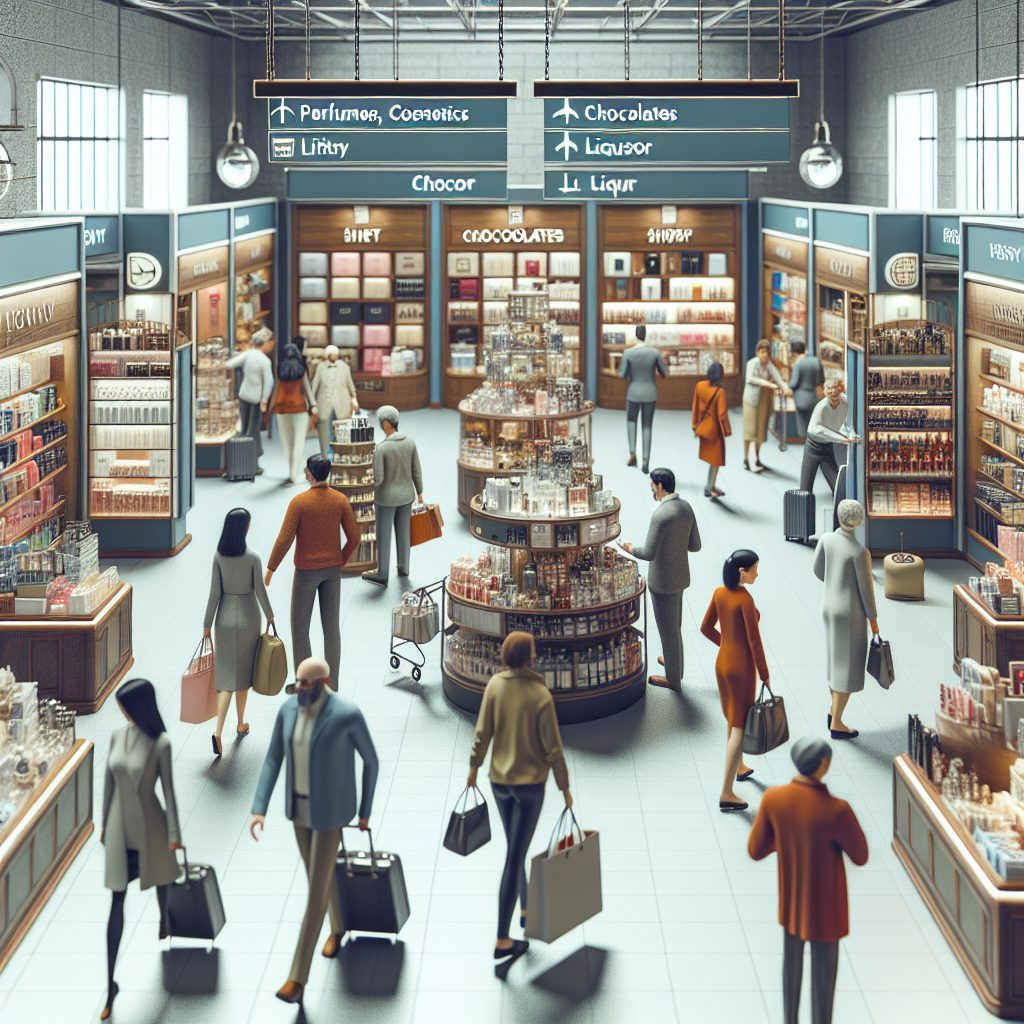
Airport retail can be defined as the sale of goods and services to passengers and visitors at commercial airports and other aviation venues. This type of retailing is particularly attractive at airports as it allows passengers to maximize their shopping time and enjoy an enhanced shopping experience that they may not have time for at traditional stores. Airport retailers strive to provide travelers with convenience while also offering an exciting shopping experience. Airport retail offerings range from newsstands, kiosks and concession stands to luxury outlets selling products such as fashion, jewelry and accessories.
Apart from providing a shopping experience, airport retailing includes services such as retail banking, services for pets, beauty and spa services, medical services, childcare services and luggage storage. Airport operators are constantly introducing innovative services that are tailored to the shopping preferences of individual travelers. Along with the convenience of in-airport shopping, airport retailers also offer travelers the opportunity to earn loyalty points or redeem rewards. Furthermore, many airports are introducing streamlined payment systems that enable passengers to make purchases without having to use cash. This is just one of the ways that airport retailers are driving innovation in the retail sector.
Key Takeaways
1. Airports are growing as locations for retailers to set up shops, kiosks, service counters, and other pop-up retailers. This is due in part to a growing number of travellers, the higher discretionary spending power of passengers travelling on long-haul flights, and the increased ubiquity of digital and online retail channels.
2. Airport retail is a key revenue source for airports. Airport retail has generated roughly €26.8 billion of revenue for airports in 2019, up by 3.5%. Although this accounts for roughly 1.8% of total airport revenue, it is one of the fastest growing revenue sources for airports.
3. The dynamics of airport retail are changing due to the decline in the number of flights and passengers at various airports and airports transitioning into multi-mode transportation hubs that offer retail services such as transport services, companion robots, and mobile apps.
4. Airport retail challenges include the need to adjust the product mix and layout to better accommodate passengers, financial constraints and difficulties in predicting passenger spending habits due to flight uncertainty.
5. To stay competitive, airports must use technology and sophisticated data analytics to identify passenger needs, reduce overhead costs, leverage retail partnerships and build customer loyalty.
What is Airport Retail Business?
Airport retail is the business of selling goods and services to travelers at airports. It includes anything from selling newspapers and magazines at the newsstands, to setting up a full-scale retail store. Airport retail customers taste, time and budget are the key drivers which limit supplier decision about the products and services. Airport retailers need to appeal to their target customers to draw them from a myriad of other competitors offering similar services.
How Is Airport Retail Different from Other Forms of Retail?
Airport retail is distinct from other forms of retail due to the multiple layers of customer demands. Airport customers are almost always in a hurry and have limited resources. Therefore, airport retailers have to optimize their services and offer something special that resonates with travelers. Airport retailers must have the capacity to understand customer taste, time, and budget to create effective promotional strategies.
Apart from the wide array of shops and products, Airport retailers also focus on creating a comfortable atmosphere for passengers. This is why airport stores are usually expanded and provide comfortable seating, convenient charging docks, wi-fi, and sometimes even showers. Airport stores also carry exclusive, luxury items that cannot be easily found elsewhere, such as a duty-free section where travelers can purchase items without being subject to local taxes and fees.
How Airport Retail Generates Revenue?
Airport retailers generate revenue by selling goods and services to travelers. Revenues are generated by selling various items, including food, books, electronics, clothes, magazines, tobacco, alcohol, and souvenirs. The items are usually sold at prices that exceed ordinary retail stores, due to factors such as high-demand, tax-free status, and convenient location.
Airport retailers may also take advantage of airport advertising opportunities in order to increase revenues. Airports usually rent out space for billboards, promotional displays, or signage. Companies such as airlines or banks will pay for advertising space at airports in order to reach out to their target customers.
What is the Future of Airport Retail Business?
The future of airport retail business looks optimistic due to the steady increase in global air travelers. According to IATA, the number of passengers is projected to double by the year 2035. This could have a massive impact on the airport retail business, as airports are continuously revising their retail strategies to keep up with the constantly evolving customer demands.
In the future, airports are expected to focus more on offering customized products and services. Airports will continue to emphasize convenience, comfort, and luxury to make travelers’ experience enjoyable and memorable.
Tips for Shopping at Airport Retail Stores
1. Avoid last minute shopping: Allow sufficient time to browse the products and find the right item for your travel.
2. Look out for exclusive offers: Many stores offer exclusive offers and discounts for passengers using the airport.
3. Check your duty free allowances: Airlines often have restrictions on what items can be brought tax-free.
4. Buy snacks for your journey: Airport stores are great places to by snacks and drinks for your in-flight journey.
5. Look out for the best deals: Airport stores offer good deals on books, magazines, electronics, etc.
6. Select the right currency: Don’t forget to check the exchange rate and pick the right currency when shopping at the airport.
What is Airport Retail?
Airport retail is a business model where operators rent retail space at the airport to offer goods and services to passengers. These goods and services range from passengers’ basic needs like grab-and-go food, to luxury products like high-end cosmetics and alcohol. Airport retail has become a strong revenue driver for airports worldwide and is now seen as an integral part of any modern airport.
What Types of Products are Sold by Airport Retailers?
Airport retailers offer a wide range of products, including convenience goods, beauty and fashion items, electronics, gifts and souvenirs, food and beverages, travel-related products, and duty-free items. Airport retailers have also developed creative ways to incorporate local products into their product offerings, such as displaying regionally produced food items or selling art and craft items made by local artisans.
Who are the Customers of Airport Retailers?
The customers of airport retailers include travelers, airport staff, and other airport visitors. Airport retailers usually offer goods and services that are designed to meet the needs of travelers, such as grab-and-go food or cell phone chargers. Airport staff and other visitors, such as arriving visitors and airline employees, are also frequent customers of airport retailers.
What is Duty-Free Shopping?
Duty-free shopping refers to the purchase of goods from a retailer that is exempt from certain taxes and duties. Such retailers are usually found at international airports, and they offer customers the chance to buy items such as liquor, tobacco, and electronics at prices that are often lower than other retailers due to the exemption from taxes and duties. Duty-free shopping has become increasingly popular for international travelers looking to purchase items at a discounted price.
Are Airport Retailers Profitable?
Yes, Airport retailers are highly profitable. Airport retailers enjoy various benefits, such as a captive customer base of travelers, no rent payments, low-cost staff, and no inventory costs. Airport retailers are also able to leverage their relationships with airports to negotiate favorable lease agreements and benefit from proximity-based promotional tactics such as airport-wide discounts. All of these factors make airport retail a highly profitable business model.
What Challenges do Airport Retailers Face?
Airport retailers face a number of challenges, such as tight airport security policies, unpredictable customer traffic, short retail hours, and high operational costs. Additionally, airport retail customers are often in a hurry and do not have much time to browse and make a purchase decision, thus forcing retailers to find creative ways to make their products stand out.
What Trends are Shaping the Airport Retail Industry?
The airport retail industry is being shaped by a variety of trends, such as the rise of digital technologies, the emergence of multi-channel retailing, and the growth of luxury and boutique products. Additionally, airport retailers are beginning to take advantage of artificial intelligence and big data analytics to optimize their product selection and pricing.
How Can Airport Retailers Improve their Profitability?
Airport retailers can improve their profitability by utilizing digital technologies, engaging in multi-channel retailing, and focusing on product innovation. Additionally, airport retailers can leverage their relationships with airports to negotiate more favorable lease terms and benefit from promotional tactics such as airport-wide discounts. Finally, airport retailers can reduce their operational costs by taking advantage of new technologies such as automated kiosks.
Are Airport Retailers Sustainable?
Yes, airport retailers are increasingly investing in sustainable business practices. Airport retailers have begun to focus on using eco-friendly products, reducing waste, and minimizing their environmental impact. Additionally, many airport retailers are partnering with local organizations to help reduce their carbon footprint and increase their positive impact on the local economy.
What is the Future of Airport Retail?
The future of airport retail is expected to include more technology-driven solutions, increased investments in sustainability, and a greater focus on product innovation. Additionally, airport retailers are likely to take advantage of digital technologies such as mobile payments and robotics to improve their customer experience and enhance their profitability.
Final Thought
Airport retail is an important revenue driver for airports worldwide and presents a great opportunity for operators to profit from high-traffic areas. In order to maximize their profitability, airport retailers must leverage the latest technologies available and focus on product innovation. By doing so, they can ensure their sustainability and long-term success in the ever-evolving airport retail industry.
The future of airport retail is expected to be characterized by increased investments in sustainability, digital technologies, product innovation, and a continued focus on customer experience. In order to stay ahead of the curve, airport retailers must embrace new technologies and partner with local organizations to bring sustainable, high-quality products to their customers.



